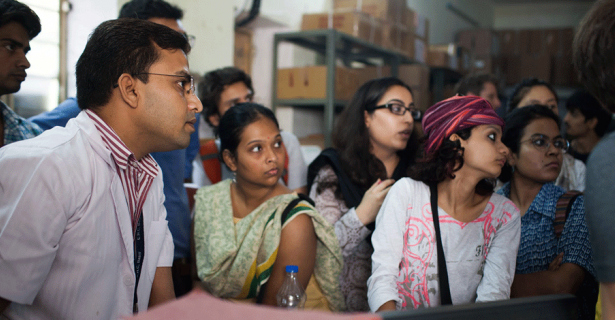Over the summer, students in the Program for Narrative and Documentary Practice participated in a two-week workshop looking at the Free Medicine Scheme (RFMS) in Rajasthan, India. The six students from Tufts University were joined by six, young Indian journalists and students; the group worked collaboratively to document the history, impact and future of the RFMS initiative.
We started our assignment in Jaipur, the capital of Rajasthan, where we met with representatives of Prayas, an NGO that has been strongly supportive of the Free Medicine Scheme and, on a broader level, works towards developing social and economic opportunities for marginalized populations of Indian society. Through meetings with various government officials and public healthcare workers, we began to gain a general understanding of the RFMS and its context within the needs and politics of Rajasthan. Our preliminary trips to District Hospitals, Community Health Centers and Drug Distribution Warehouses gave us an overview of how 600 generic medications are procured and distributed across the state. However, in order to thoroughly document the Rajasthan Free Medicine Scheme, we had to independently explore key questions: How did it begin? What has it accomplished? What are its shortcomings? What is its future?
Splitting up into teams equipped with at least one photojournalist and one writer, we left for different cities and towns of Rajasthan, from the deserts of Bikaner to the indigenous areas of Banswara. Each group investigated separate facets of the RFMS. One group documented the overwhelming success of the scheme in Udaipur while another covered the challenges that the scheme faces in remote, tribal regions. Some remained in Jaipur to continue interviews with officials and administrators; others focused on the program’s history in Chittorgarh. After conducting interviews, spending dozens of hours in public hospitals, following up with contacts, visiting patients in their homes and wards, and sifting through massive amounts of information, we returned to the capital in order to regroup, debrief, and collectively envision what the final story would look like.
We began the workshop with two goals. One, to document the Rajasthan Free Medicine Scheme and two, to understand what it means to be on assignment as a journalist. Many of us were immersed in the complicated, demanding and exhausting nature of working on a story in the field. However, the group’s dedication to the craft was apparent when, even after fourteen days of constant challenges, people spoke about their experiences and opinions on the subject with passion and curiosity. Like most storytellers, we hope that the accumulation of these experiences is expressed effectively through our photography and words.

